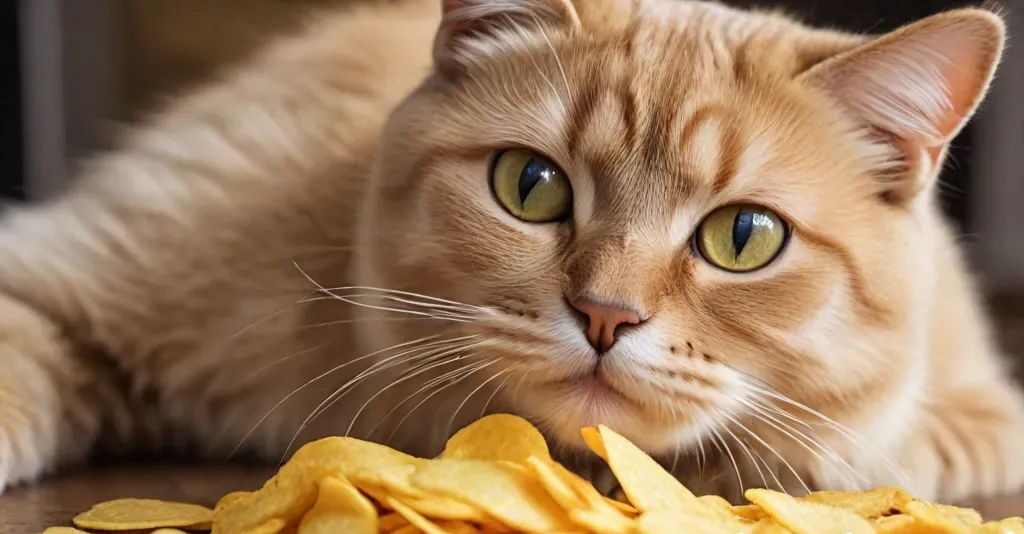
Can Cats Eat Crisps? All you need to know
What Are Crisps?
Crisps, known as chips in the United States, are thin slices of potato that are deep-fried or baked until crunchy. They are a popular snack worldwide and come in various flavors, including salted, cheese, barbecue, and more. The primary ingredients in crisps are potatoes, oil, and salt, but they often contain additional flavorings, preservatives, and additives.
Can Cats Eat Crisps?
So, can cats eat crisps? The short answer is no. While a small piece of crisp may not cause immediate harm, crisps are not suitable for cats for several reasons:
- High Salt Content: Cats have a much lower tolerance for salt than humans. High salt intake can lead to sodium poisoning, which can cause symptoms like vomiting, diarrhea, lethargy, and even seizures.
- Unhealthy Fats: Crisps are often fried in unhealthy oils, which can lead to obesity and other health issues in cats. Cats need healthy fats in their diet, but the trans fats and saturated fats found in crisps are not beneficial for them.
- Additives and Preservatives: Many crisps contain artificial flavors, preservatives, and additives that can be harmful to cats. Ingredients like onion powder and garlic powder, commonly found in flavored crisps, are toxic to cats.
- Digestive Issues: Cats have a sensitive digestive system, and eating crisps can lead to gastrointestinal upset, including vomiting and diarrhea.
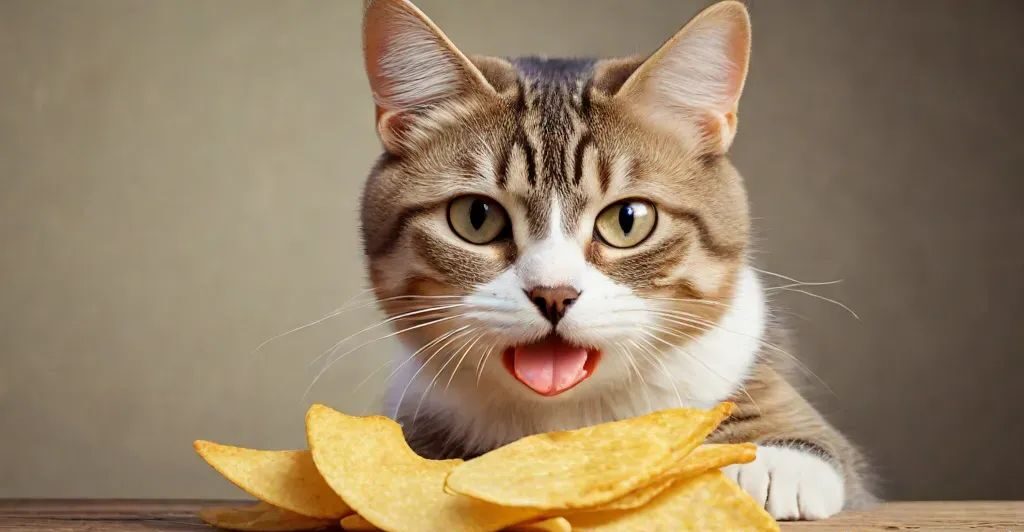
The Risks of Feeding Crisps to Cats
Can cats eat crisps? – To understand why crisps are not a good snack for cats, let’s delve deeper into the specific risks associated with feeding crisps to cats.
- Sodium Poisoning: Cats require a small amount of sodium in their diet, but the high salt content in crisps can easily lead to sodium poisoning. Symptoms of sodium poisoning in cats include excessive thirst, urination, vomiting, diarrhea, and in severe cases, seizures, coma, and death.
- Obesity and Weight Gain: The unhealthy fats in crisps contribute to weight gain and obesity in cats. Obesity can lead to a host of health problems, including diabetes, arthritis, and heart disease. Keeping your cat at a healthy weight is very important for their overall health and happiness.
- Toxic Ingredients: Many crisps contain ingredients that are toxic to cats. For example, onion and garlic powder can lead to hemolytic anemia, which is a condition where the body breaks down red blood cells faster than it can make new ones. This can lead to weakness, lethargy, and in severe cases, death.
- Digestive Upset: Cats have a delicate digestive system, and eating crisps can lead to gastrointestinal issues. The high-fat content and artificial additives can cause vomiting, diarrhea, and stomach pain.
Can Cats Eat Cheese and Onion Crisps?
Cheese and onion crisps are a popular flavor, but they pose even more risks to cats than plain crisps.
- Onion Toxicity: Onions, including onion powder, are highly toxic to cats. Ingesting even a small amount can cause hemolytic anemia, which destroys red blood cells. This can be very dangerous for your pet and needs a vet to look at it right away.
- Cheese: While cheese itself is not toxic to cats, it can still cause problems. Many cats are lactose intolerant, and consuming cheese can lead to digestive upset, including diarrhea and vomiting. The combination of cheese and onion in crisps makes them particularly unsuitable for cats.
- High Salt and Fat Content: Cheese and onion crisps contain high levels of salt and unhealthy fats, which, as mentioned earlier, can lead to sodium poisoning, obesity, and other health issues in cats.
Can Cats Eat Prawn Cocktail Crisps?
Among the many flavors of crisps, prawn cocktail crisps are quite popular. But can cats eat prawn cocktail crisps? The answer is still no. Prawn cocktail crisps pose additional risks due to their unique flavorings and ingredients.
- Flavorings and Additives: Prawn cocktail crisps often contain artificial prawn flavoring, along with other additives and preservatives. These ingredients can be harmful to cats, potentially leading to allergic reactions or digestive issues.
- High Sodium Content: Just like other crisps, prawn cocktail crisps have a high sodium content. Excessive salt intake can cause sodium poisoning in cats, leading to serious health problems.
- Sugar and Spices: Some prawn cocktail crisps may contain added sugars and spices to enhance their flavor. Cats do not need sugar in their diet, and certain spices can be toxic to them.
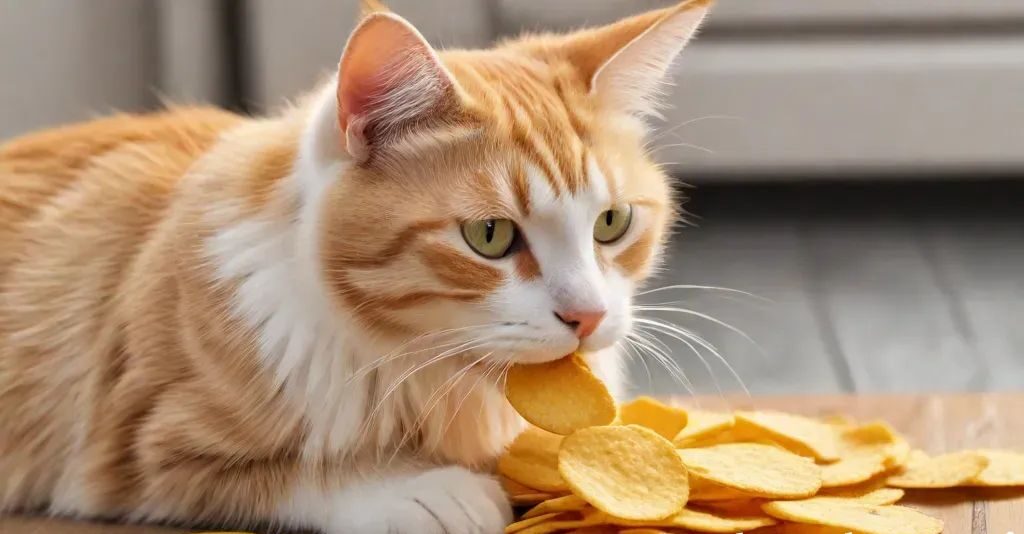
Healthy Alternatives to Crisps for Cats
If you want to give your cat a special treat, there are many healthier alternatives to crisps that you can offer. Here are some cat-friendly snacks that are both safe and nutritious:
- Cat Treats: Many commercially available cat treats are specifically formulated for feline nutrition. Find treats that are low in calories and made with good-quality ingredients.
- Cooked Meat: Small pieces of cooked chicken, turkey, or fish can be a tasty and healthy treat for your cat. Make sure the meat is plain, without any seasoning or sauces.
- Catnip: Many cats enjoy catnip, which can be a fun and safe treat. You can offer catnip in dried form or as a catnip toy.
- Vegetables: Some cats enjoy vegetables like cooked carrots, peas, or pumpkins. Find treats that are low in calories and made with good-quality ingredients.
- Cat Grass: Cat grass is a safe and healthy snack that can aid in digestion and provide enrichment for your cat.
How to Keep Your Cat Healthy and Happy
To ensure your cat remains healthy and happy, it’s important to provide a balanced diet and avoid feeding them human foods like crisps. Have a look at some tips for maintaining your cat’s health:
- Feed a Balanced Diet: Choose a high-quality commercial cat food that meets your cat’s nutritional needs. Look for foods that list meat as the first ingredient and avoid those with excessive fillers and artificial additives.
- Provide Fresh Water: Always ensure your cat has access to fresh, clean water. Hydration is essential for your cat’s health, especially if they primarily eat dry food.
- Regular Vet Check-ups: Go for regular check-ups with your vet to monitor your cat’s health and diagnose any problem early.
- Exercise and Enrichment: Keep your cat active and engaged with regular playtime and enrichment activities. Toys, climbing structures, and interactive games can help prevent obesity and boredom.
- Avoid Toxic Foods: Be aware of foods that are toxic to cats and keep them out of reach. In addition to crisps, avoid feeding your cat chocolate, caffeine, alcohol, grapes, raisins, onions, and garlic.
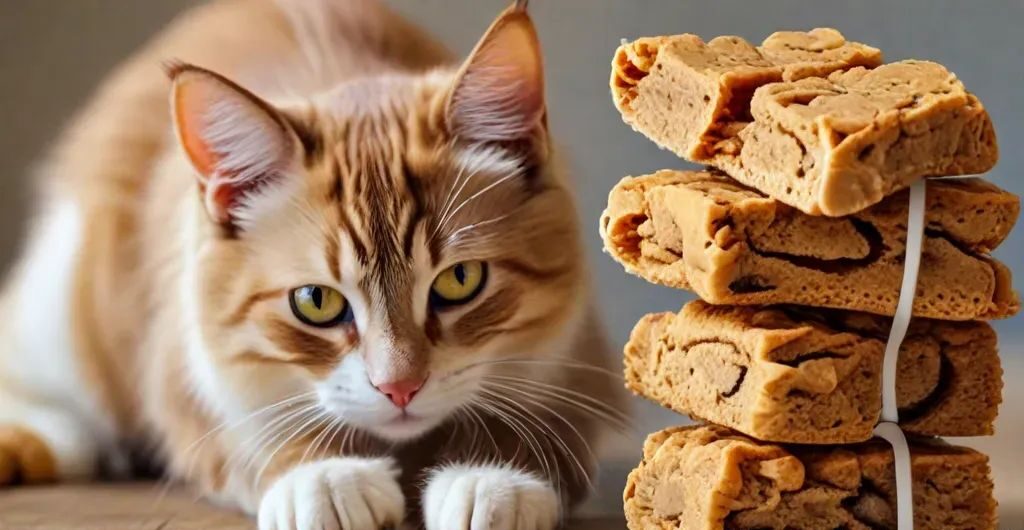
Homemade Treats for Cats
You can make safe and healthy treats for your cat at home. Here are some simple recipes:
- Tuna Bites: Mix canned tuna with a bit of flour and bake.
- Chicken Jerky: Thinly slice chicken breast and bake until dry.
- Catnip Cookies: Combine whole wheat flour, catnip, and water to make a dough, then bake.
Consulting Your Veterinarian
Always talk to your vet about your cat’s diet and treats. They can give you advice based on your cat’s health and needs.
Understanding Your Cat’s Dietary Needs
- Protein: Cats need high-quality animal protein to maintain their muscle mass and overall health. Look for cat foods that list specific meat sources, such as chicken, turkey, or fish, as the main ingredient.
- Fats: Healthy fats are important for energy, coat health, and skin. Cats need omega-3 and omega-6 fatty acids to stay healthy. Ensure the fats in your cat’s diet come from animal sources and are not overly processed.
- Vitamins and Minerals: Cats require a variety of vitamins and minerals for optimal health. Taurine, an essential amino acid for cats, must be present in their diet as they cannot produce it on their own. A balanced commercial cat food will include the necessary vitamins and minerals.
- Limited Carbohydrates: While some carbohydrates can be beneficial, they should not make up a large portion of a cat’s diet. Cats have limited ability to digest and utilize carbohydrates, so it’s best to choose foods with low carbohydrate content.
Common Misconceptions About Cat Diets
There are several misconceptions about what cats can and cannot eat. It’s important to separate fact from fiction to ensure your cat’s diet is safe and healthy.
- Milk and Dairy: Contrary to popular belief, most adult cats are lactose intolerant and cannot digest milk properly. Feeding milk or dairy products can lead to digestive upset, including diarrhea and stomach pain.
- Raw Meat: While cats are carnivores, feeding raw meat can pose risks due to potential bacteria and parasites. It’s safer to offer cooked meat to avoid these risks.
- Human Foods: Many human foods, including crisps, are not suitable for cats. It’s best to stick to foods and treats specifically formulated for feline nutrition.
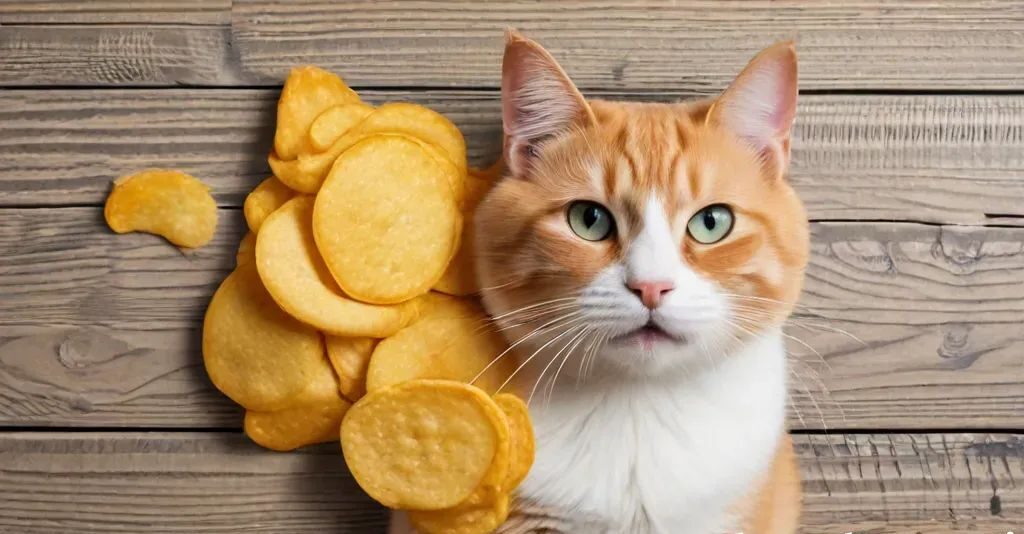
What to Do If Your Cat Eats Crisps
If your cat eats crisps, do this:
- Remove Access: Make sure your cat can’t eat more.
- Monitor for Symptoms: Watch for signs of salt poisoning or stomach problems.
- Consult Your Vet: If your cat shows any symptoms, contact your vet.
FAQS: Can cats eat crisps?
Why Do Cats Love Crisps?
Cats might be curious about crisps because they’re crunchy and have a strong smell. The scent of crisps can catch their attention, but just because they seem interested doesn’t mean they should eat them. Crisps are not good for cats.
Can Cats Have Walkers Crisps?
No, cats should not have Walker crisps. These crisps are high in salt and fat, which can make your cat sick. They also have flavors and additives that are not safe for cats.
Can Cats Lick Salt and Vinegar Crisps?
No, cats should not lick salt and vinegar crisps. The salt and vinegar can upset their stomach and cause health problems.
Can Cats Eat Ready Salted Crisps?
No, cats should not eat ready-salted crisps. These crisps have a lot of salt, which can be harmful to cats. Eating them can lead to health issues like vomiting or diarrhea.
Can Cats Eat Salt and Vinegar Crisps?
No, cats should not eat salt and vinegar crisps. The salt and vinegar can make your cat sick and upset their stomach. It’s best to avoid giving your cat any type of crisps.
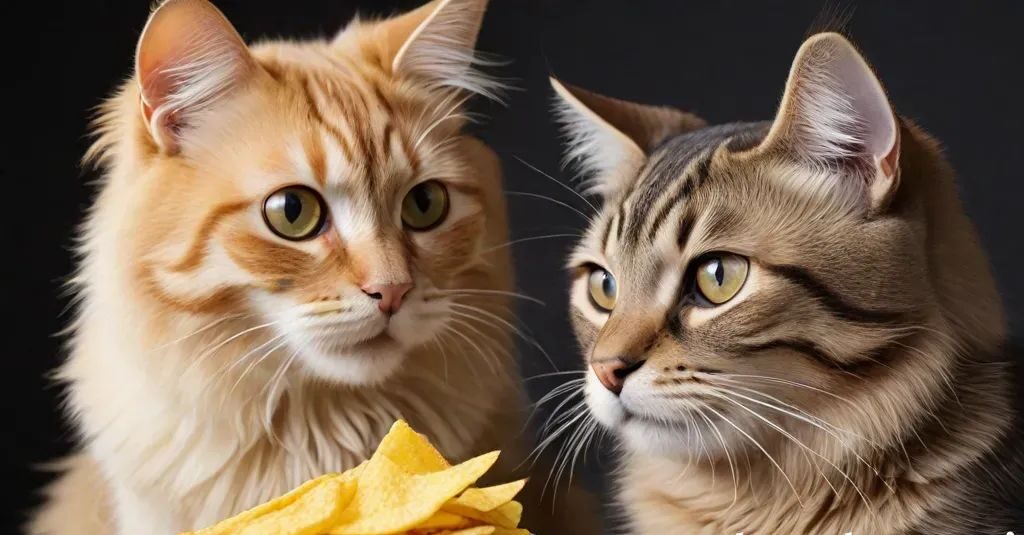
Final Thoughts: Can cats eat crisps?
Sharing your snacks with your cat can be tempting, but it’s not a good idea. Can cats eat crisps? The answer is no. Crisps are too salty and full of unhealthy fats, and they might have harmful ingredients like onion and garlic powder. These can make your cat very sick. Instead, choose safe treats made just for cats and make sure their diet is healthy. By doing this, you’ll help keep your furry friend happy and healthy.
Can You Spay a Cat in Heat?

I am a dedicated writer and expert in cats, with years of experience studying feline behavior, health, and breeds. Passionate about sharing my knowledge, I provide valuable insights and practical advice to help cat lovers understand and care for their furry companions. When not writing, I enjoy spending time with my beloved cats, continually learning and deepening my expertise.
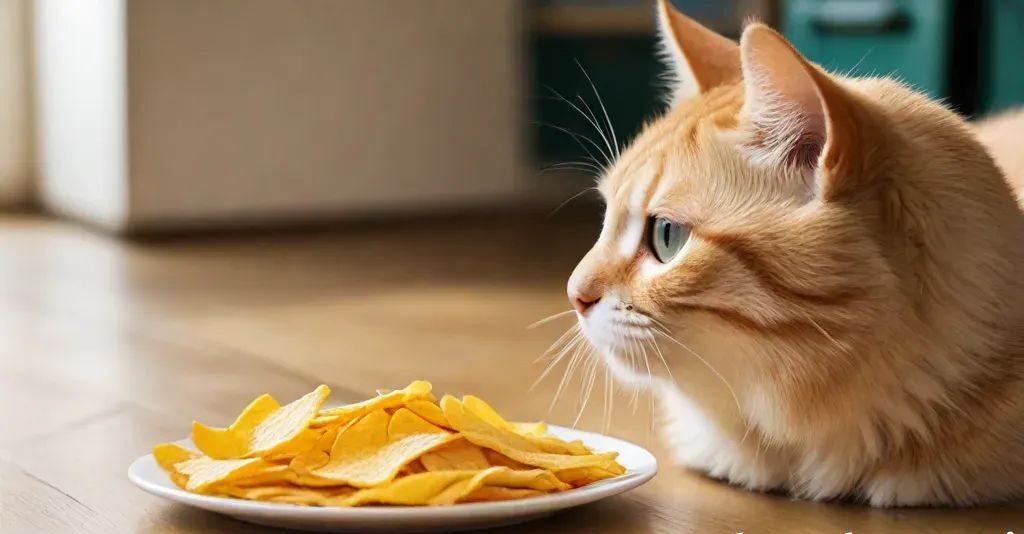
Leave a Reply